Homes & Neighborhoods
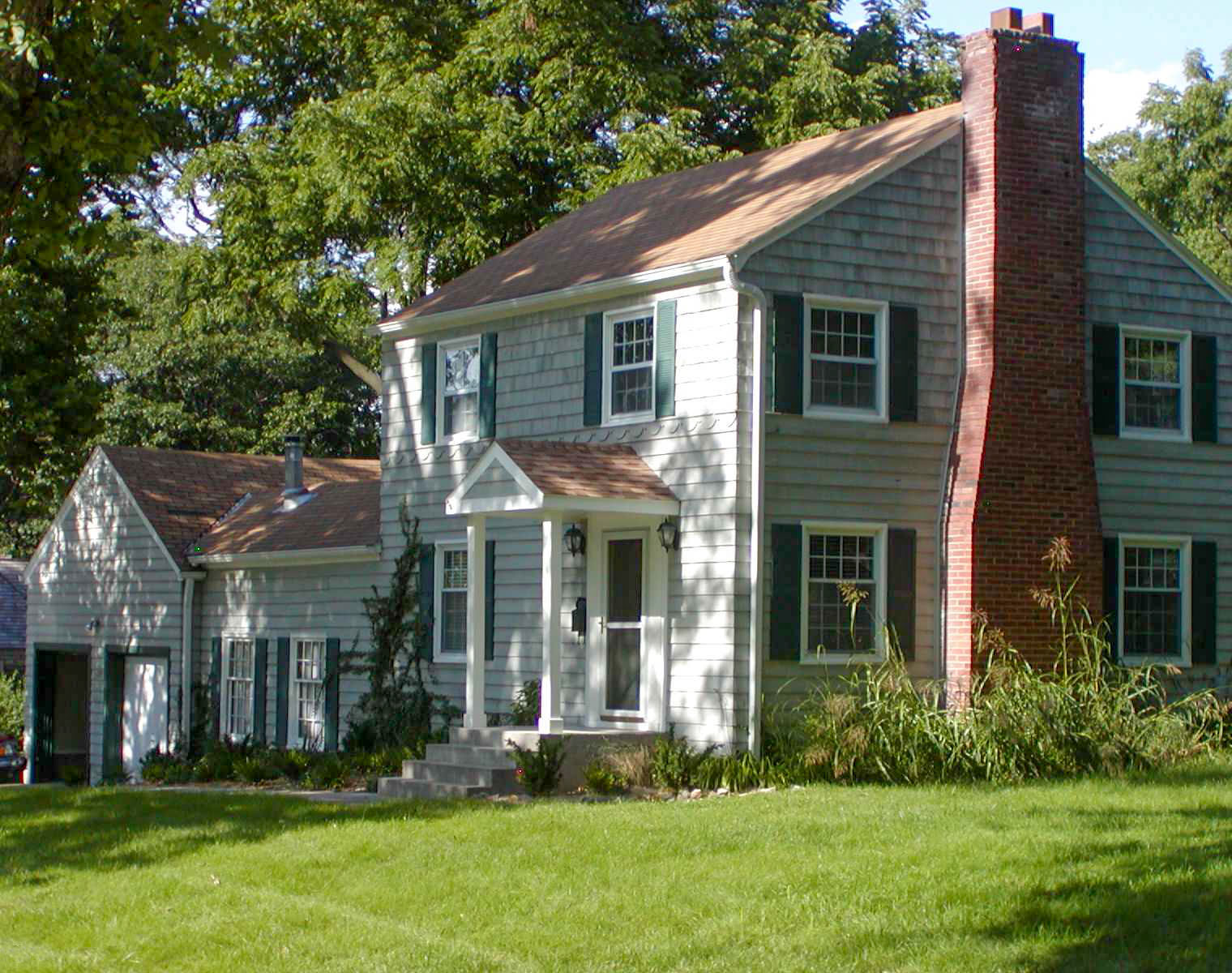
Our Homes & Neighborhoods
Municipal Codes
Having been a resident and business owner interacting with Merriam across a variety of matters, I believe there are areas where municipal ordinances and codes should be reviewed in view of the changing needs of residents and the blurring of lines between home and work. Some ordinances that I have encountered over the years need to be reviewed, possibly updated, and made clearer in terms of the language to better reflect modern conditions and make compliance clearer.
Currently, some ordinances have to be interpreted at the staff level for new situations that the ordinances were not intended to address. The City Council should be making many of those decisions about policy to insure consistent treatment is provided to members of the public. Good clear understanding and presentation of city rules is important for residents and businesses considering a move to our community.
Similarly the city should balance the needs of the property owners against overly restrictive zoning constraints. I have seen some positive movement in this area recently with some changes implemented that I had suggested to city staff that involved changing fixed size limitations on accessory structures and detached garages to a more flexible size based on the overall land area of the residential property. An acre sized lot should reasonably be allowed to have a slightly larger footprint for a detached garage than a quarter acre tract.
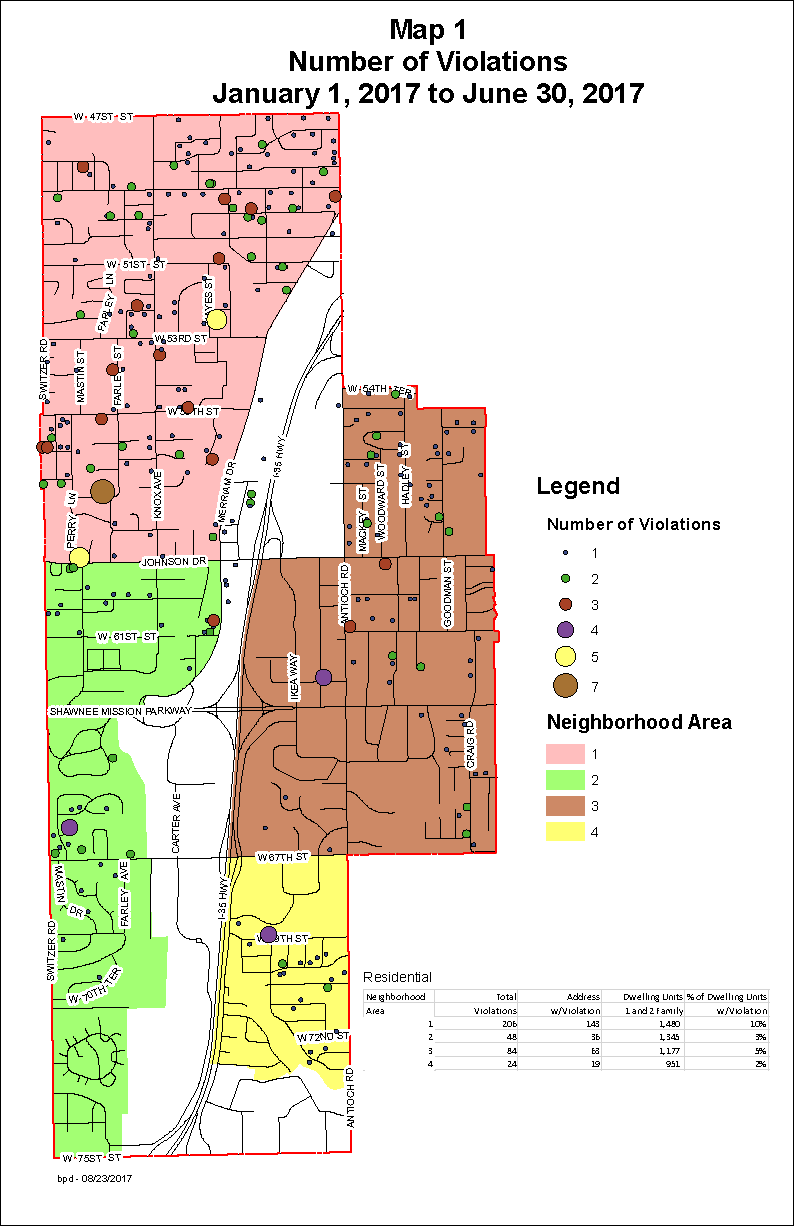
Our Homes & Neighborhoods
Land Use / Property Maintenance
Just like everything else that makes a community work well, municipal codes and their enforcement work well when the laws and their implementation are balanced. Codes that relate to land use and property upkeep are helpful in preserving the character and vibrancy of our neighborhoods. The overall condition and state of repair for a property enhances value to all property owners in the area. The converse is true as well.
Conceptually, how a property owner uses his property should, where possible, be left to the property owner. The property is often the owner's most important asset and he/she should be able to fully utilize that asset as long as it is not detrimental to the neighbors. As a property owner here "in town" and with some farm property in a more rural setting, I am fully aware of the differences in mindset between people regarding land use and appropriate restrictions in local law.
In municipal government, this balance between the needs of the property owner and the needs of the neighbors and community must be carefully maintained. Some residents view their neighborhood as a 'bedroom community' that they return to after a day at the office to eat, relax and sleep. Others see their home as more of a base of operations for activities related to living, work, and recreation. We must recognize these differences and strike balance in our land use ordinances.
Some of the changes made by the City Council while moving the city in a direction that may be seen as positive for overall property values and which may work very well for some residents, could be burdensome for other residents depending on their particular circumstances. This can be particularly true for elderly residents, disabled residents, or those of lesser means, including those temporarily in financial distress.
As a City Council member, I will seek to understand how changes to our city codes will affect residents on an individual basis as well as from a community standpoint before voting to approve such changes. If some residents are negatively impacted, I will use my efforts to see how the city can help make the transition easier for the compliance-challenged residents, either directly or by coordinating volunteer programs to help those neighbors.
For reference I analyzed the 377 code violation letters sent out by the City during the first six months of 2017 and grouped them according to the general nature of the problem found by Merriam codes enforcement officers:
- Vehicles (140 violations)
- 'Unauthorized Boats, Trailers, Campers' (52)
- 'Unauthorized Off-Street Parking or Loading' (45)
- 'Outside Storage Inoperable Vehicle(s)' (42)
- 'Overnight Storage of Vehicle in Residential Area' (1)
- Lawn (71 violations)
- 'Weeds' (71)
- Storage (49 violations)
- 'Unauthorized Outside Storage' (49)
- Trash Containers (33 violations)
- 'Improper Storage of Solid Waste Containment' (33)
- Buildings (31 violations)
- 'Substandard Exterior Building Conditions' (17)
- 'Failure to Maintain Premises' (14)
- Trees (18 violations)
- 'Failure to Remove Dead Trees' (18)
- Driveways (15 violations)
- 'Failure to Maintain Driveways' (15)
- Address Numbers (12 violations)
- 'Failure to Display Address Numbers' (12)
- Other (8 violations)
- 'Maintaining A Public Nuisance' (6)
- 'Failure to Maintain Pools, Spas, Hot Tubs' (1)
- 'Failure to Comply with Property Use' (1)
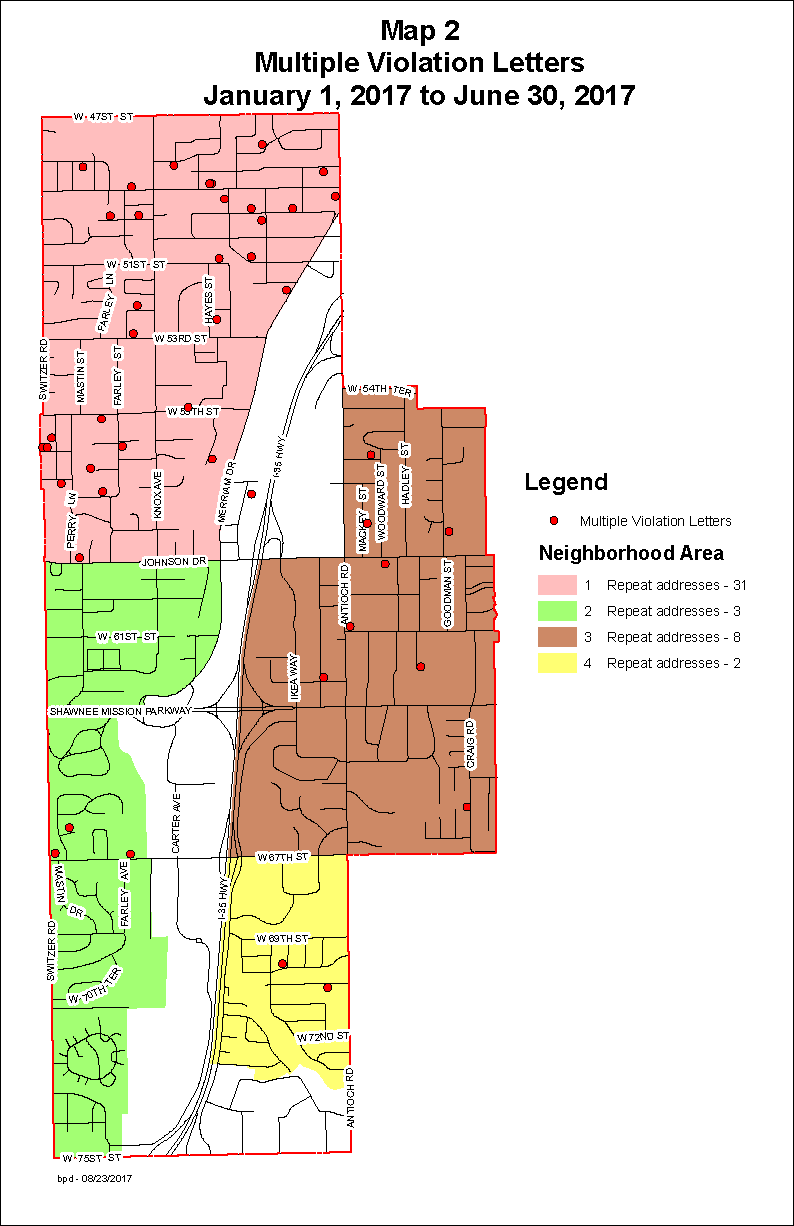
Our Homes & Neighborhoods
Codes Enforcement
Code enforcement is a necessary tool in maintaining our neighborhoods. On the other hand, relying on the enforcement 'sticks' alone can be missing the balance that is essential to the overall goal of having not only a neighborhood that looks good, but one where there is a level of neighborly tranquility.
Merriam has code compliance officers whose job it is to seek out code violations. Tax dollars are spent pro-actively looking for problems. Some say this is a good use of tax dollars. I would agree that we need code enforcement officers. Citizen complaints should definitely be investigated. Right now most of the code letters are sent out based on observations by city code enforcement officers actively looking for violations.
I would have less concern about this approach of sending out enforcement letters if the city did a better job pro-actively educating residents about the responsibilities of property ownership in Merriam.
When I moved into my house 13 years ago, my first contact with the City of Merriam was a codes enforcement officer notifying me that I needed to pave the gravel portion of my driveway.
My home was built in 1937 and as a Class A Licensed General Contractor in Johnson County, I knew that my gravel drive was actually 'grandfathered in' and did not need to be in compliance with the newer city requirements for driveways. As a gesture offered in the spirit of cooperation with my new community, I did however agree to add more gravel and improve the appearance of the driveway area that I had just purchased as part of my new Merriam property. The initial encounter with the City left me with a bad taste in my mouth as a new resident of Merriam however.
While I think that a better effort at communication is in place now than in the past, we still have room for improvement.
I believe that the first contact a resident receives about a problem should not just be an enforcement letter citing the penalties for failure to comply and a date by which the penalties will be enforced for non-compliance.
I would like to see a more balanced approach. If elected, I will work to make that balance more of a reality.
First, I want to increase the communication with residents by having a better web presence that provides compliance information and potential solutions for residents that may be unable to get their property up to code quickly without some assistance.
Secondly, for those residents where the non-compliance is due to a hardship situation, I would like the City Council to consider organizing a volunteer group called something like the Merriam Property Assistance Team to help residents avoid the penalty phase for non-compliance by steering those residents to appropriate help in bringing their property into compliance.
For example, if a resident has a short term problem mowing their lawn because their lawn mower has broken down and they are unable to purchase another mower right away, the resident would be able to contact the Merriam Property Assistance Team response coordinator who would assess the need and direct the resident to a solution if possible.
The help could be simply to provide a list of repair shop contacts that could potentially fix the mower. If the resident could not get the mower transported to and from the shop, the volunteer coordinator might be able to find a volunteer to help transport the mower. The volunteer group might be able to provide access to a loaner mower. The coordinator could also potentially provide contacts to a lawn service that would be willing to do a one-time mowing for a reasonable fee. In some hardship cases the volunteers might agree to actually do the mowing.
As your City Council representative I would personally volunteer to organize such a group.
The point is that as city leaders, sometimes we need to be able to think outside the box and help our neighbors by providing a carrot as well as the stick to encourage the desired goals.
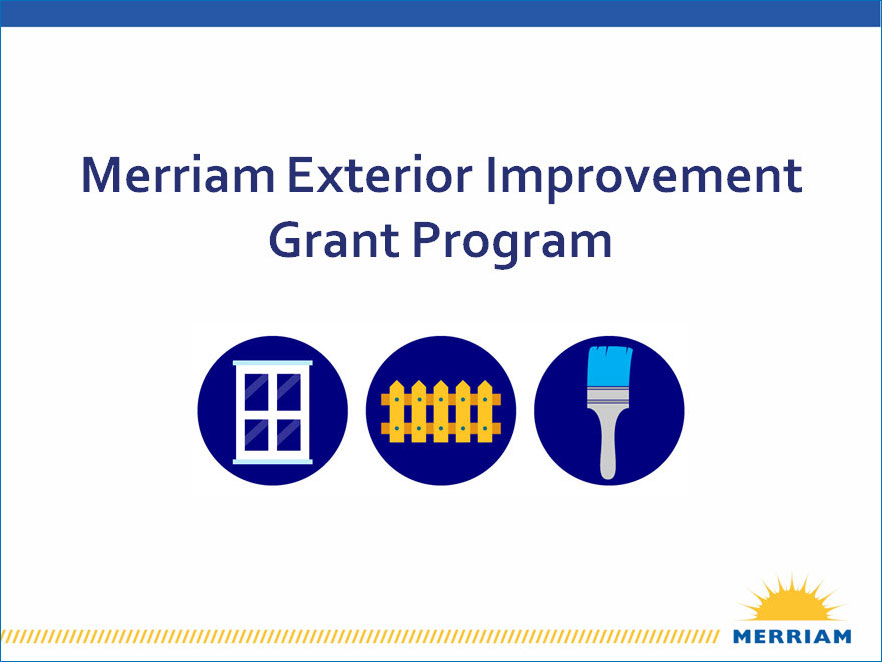
Our Homes & Neighborhoods
Improvement Incentives
The city will shortly be introducing a pilot program to assist residents with exterior improvements to their residential properties with the goal to "reinvest in Merriam's housing stock."
The Merriam Exterior Improvement Grant Program will reimburse approved homeowners for 20% of the cost of improvement to the exterior of residential homes for projects costing between $4,000 and $12,500. The city would fund from $800 to $2,500 of the cost for such completed projects. This assistance could include improvements such as painting which could help address certain code violations (e.g. peeling paint) in some cases.
The program would be available for virtually any improvement other than building an in-ground pool. Total city funds available will be $36,000 disbursed on a first come, first approved basis. The selection process gives no extra weighting to hardship situations where money could be directed to bring a property into code compliance.
The problem with this new Merriam initiative is that the project threshold is too high to help many financially strapped homeowners with smaller projects that could help bring their properties into compliance with property maintenance ordinances.
The minimum $4,000 homeowner expenditure required under the Merriam Exterior Improvement Grant Program will likely be more expensive than a financially constrained resident can afford.
While the exterior beautification initiative may be a worthwhile effort, I favor enacting some similar program or changing the new program so it also directs incentive funds toward assisting financially challenged property owners in preventing deterioration of their homes. Such an assistance program needs to operate at a lover overall homeowner investment threshold than the new Merriam Exterior Improvement Grant Program will.
As a long-time Johnson County construction general contractor, I know that being able to fix the problems that cause existing homes to be subject to rapid deterioration is a critical investment that could be made "in Merriam's housing stock."
For example, avoiding water penetration into a home whether from roof leaks, bad gutters, improper grading, deferred painting with subsequent wood rot, or a host of other maintenance problems is often difficult for aging and financially challenged residents to accomplish without help. Not promptly taking care of water intrusion issues also creates secondary problems like attracting carpenter ants which can cause structural damage.
If elected to the City Council, I will propose moving some of the overall city housing stock investment dollars into a means-tested program that incentivizes our more needy residents to help them keep their homes and property maintained and code-compliant.
Merriam's current City Council is willing to financially incentivize more affluent homeowners to invest in their homes in bigger dollar chunks without regard to need. If we are going to do that, we should also earmark some resources to our less affluent residents rather than just issue code violation citations. Making homes prettier is one thing that may make neighbors feel better. Making our housing stock physically sound keeps our community stable.
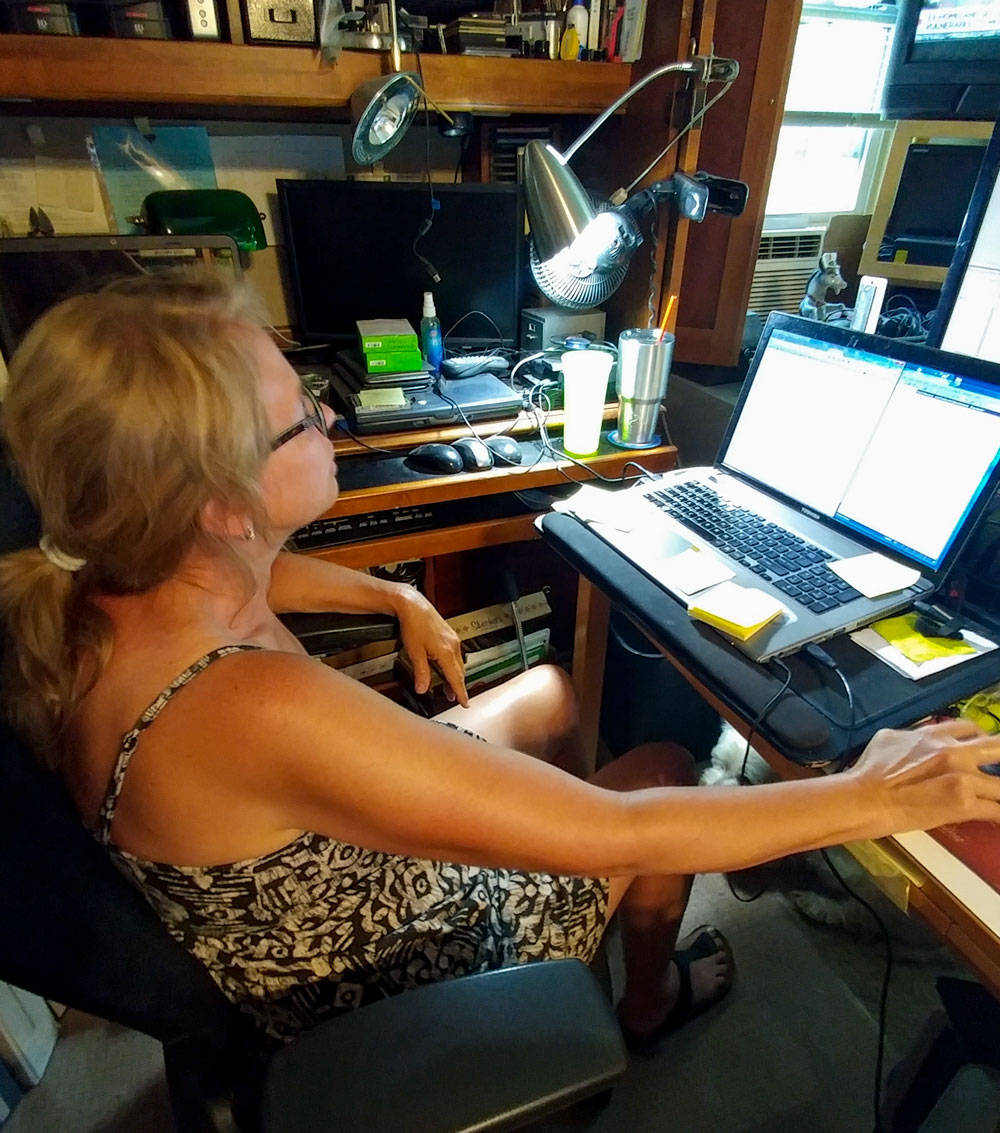
Our Homes & Neighborhoods
Working from home
By way of example, one area of the Merriam Municipal Code that needs to be updated are the zoning ordinances related to residents performing work from home, as is increasingly common in the modern digital age.
When these municipal statutes were developed in the late 1950s and 1960s, most people didn't even have computers at work, let alone at home. Now people routinely perform work from home on the computer.
A reading of relevant ordinances essentially could be interpreted as requiring anyone working from home using a computer on even a part-time basis to obtain a home occupation permit from the Merriam Planning Commission.
According to the Merriam Municipal Code:
Sec. 74-467. - Authorization.
A home occupation that is customarily incidental to the principal use of a dwelling and may be permitted as a conditional use when approved by the planning commission. The expressed intent behind regulating home occupations is as follows:
- To preserve the residential character of neighborhoods.
- To preserve the residential rights of neighbors, while reasonably allowing residents to utilize their residences to enhance or fulfill personal economic goals.
- To establish reasonable criteria for the operation of home occupations in dwelling units.
- To preserve and protect municipal and utility services such as streets, sewers and water systems against increased utilization typical in commercial districts.
- To preserve tranquility in neighborhoods and prevent non-residential activities typically found in commercial districts.
I would argue that someone working in their home on a computer does not possibly threaten any of the stated intents behind regulating 'home occupations.'
This is not the kind of distinction that the Merriam Municipal Code makes when considering the most common type of 'home occupation' performed within residential structures in 2017.
No distinction is made between intellectual work performed on a laptop computer at home and a home occupation like a lawnmower repair business operating out of a resident's garage. Digital work on a computer that is similar to and fully consistent with recreational uses of a computer within a residence is a completely different regulatory problem as compared to regulating other home occupations which might use other equipment, create noise, increase traffic, or involve other activities that could potentially affect neighbors.
Under current law, any 'person' with a home occupation permit working in their home office is required to obtain a $40/yr occupational license from the city. According to the Merriam Municipal Code, "The requirements for an occupational license for a home occupation shall apply."
The granting of a home occupation permit which allows a resident to use part of his/her home as a home office is an overly cumbersome process that involves sending registered letters to all neighbors with property lines within 200 feet of your property line at least 10 days prior to the Planning Commission taking up your application for a home office in a hearing.
Is it really necessary to go look up property plats to determine which tracts are within 200 feet of your property, look up the owners names and addresses, prepare notices informing them that you intend to work on your computer in your house, send them registered letters noticing them that your application will be heard in a hearing of the Merriam Planning Commission 10 days hence if they wish to object, just in order to get the City of Merriam's permission to utilize a portion of their time at home working on a computer?
According to the Merriam Municipal Code:
Sec. 74-468. - Definitions.
The following words, terms and phrases, when used in this article, shall have the meanings ascribed to them in this section, except where the context clearly indicates a different meaning:
Home occupation means a business, profession, occupation or trade conducted, wholly or in part, within a residential building or within a structure accessory to a residential building.
Home office means a home occupation involving no customers or employees on premises, no outdoor signage, no storage of goods for sale on premises and no storage of tools or equipment for use on or off premises.
Whether or not to enforce this ordinance and exactly how it is enforced is up to the discretion of Merriam city staff because the ordinances do not adequately address modern work/home paradigms. Merriam staff actively seek out instances of business mailings that use Merriam residential addresses in order to require those residents to obtain home occupation permits and occupation licenses. The fact that business mail is sent to a Merriam residential address is evidence to city staff that someone may be operating an illegal home occupation without an occupational license.
According to the Merriam Municipal Code:
Sec. 14-27. - Occupational license fees.
Every person engaged in any business, occupation, pursuit, profession, institution, establishment, utility or commodity specified in this article shall pay for a license from the city. The fee for such license shall be in the respective amounts set forth in the fee schedule maintained by the city clerk and updated annually.
Even though the municipal code refers to a 'person,' city staff are interpreting the occupational license requirement for a home office inconsistently. As a small business owner, I pay for two occupational licenses which cover computer work performed at home on behalf of three business entities that I own. One original occupational license includes two legal entities, a software company and a construction company. A second occupational license was required when I filed incorporation papers for a new LLC using my home address as the address of record with the State of Kansas for the digital media business.
Inconsistent interpretation, overly cumbersome compliance, and non-equitable application of these ordinances make Merriam an unfriendly place for small business startups. This kind of arbitrary administration of ambiguous city ordinances also has the psychological impact on some residents giving them the feeling that the city is persecuting them unfairly.
As your city council representative, I will listen to constituent complaints about overly restrictive, burdensome, or outdated ordinances and work to achieve the desired aims of the law in a way that balances the worthiness of the intent against the compliance burden on residents.
